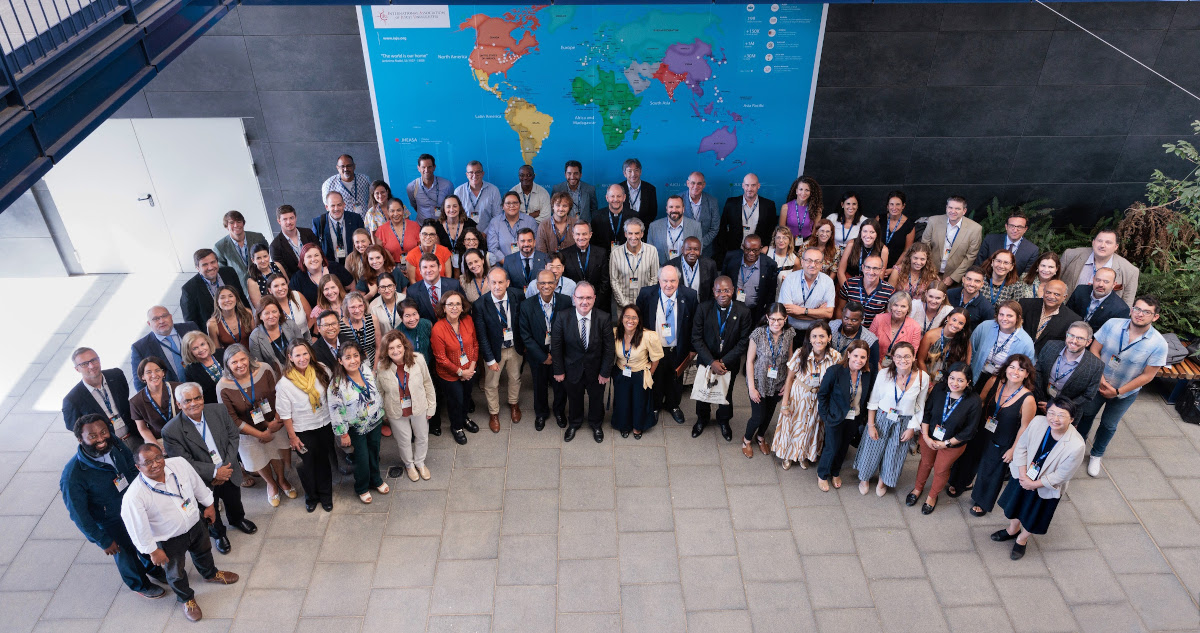 The International Association of Jesuit Universities (IAJU) held its International Education Conference in Universidad Loyola, Sevilla, Spain from 19 to 21 September. It brought together more than a hundred representatives of Jesuit universities, vice-rectors, and heads of International Relations from 28 countries around the world, including the Philippines, South Korea, Japan, and Australia. IAJU is the largest network of higher education institutions in the world, comprising 180 institutions on all five continents.
The International Association of Jesuit Universities (IAJU) held its International Education Conference in Universidad Loyola, Sevilla, Spain from 19 to 21 September. It brought together more than a hundred representatives of Jesuit universities, vice-rectors, and heads of International Relations from 28 countries around the world, including the Philippines, South Korea, Japan, and Australia. IAJU is the largest network of higher education institutions in the world, comprising 180 institutions on all five continents.
With the theme, “Strengthening Jesuit International Education in Time of Global Challenge”, the conference derived inspiration from General Congregation 36 (GC36), which marked networking as a need for the Society to move forward. Decree 2 of GC36 invites us to network internationally and across sectors as an opportunity to strengthen our identity by sharing resources and commitments at the local level to serve the universal mission together.
The various presentations addressed some of the priorities of Jesuit universities. Fr Joseph Christie SJ, Secretary for Higher Education and President of IAJU, in his keynote said that the meeting was “fundamental for the exchange of experiences and good practices, as well as for joint reflection”. He emphasised the need to train our students to have a global perspective to address global challenges, such as the growth of nationalism, the growing hostility towards other cultures or religions, and climate change.
“We are living in an era of globalisation marked by interdependence and interconnectedness, facilitated by new technologies, so it is critical to establish greater collaboration to share strengths and result in greater synergies,” said Fr Christie.
Likewise, Fr Daniel Villanueva SJ, Executive Vice-President of the Jesuit NGO Entreculturas and Trustee of ESADE Foundation and ICAI Foundation at the Universidad Pontificia Comillas, described collaboration and networking as a hallmark of the Society of Jesus and the best way to respond to the mission of Jesuit universities.
Other leaders of higher education institutions and associations who participated in the conference included Alfonso Gentil Álvarez-Ossorio, director of SEPIE (Spanish Service for the Internationalisation of Education); and Laura Rumbley, Director of Research and Knowledge at the European Association for International Education (EAIE), the largest association of higher education educators in Europe.
Among the conclusions drawn at the end of the programme, Borja Martín Garrido, Director of International Relations at Loyola University, noted that the association must gain visibility so that Jesuit universities are represented. He also mentioned the need for a more egalitarian international representation within the association that would allow us to learn more from other realities such as those experienced in Africa or Southeast Asia and, above all, to create a common identity under a culture of generosity.
In addition to the plenary sessions, the conference also featured parallel activities, meetings of the regional associations, tours to the Real Alcazar de Sevilla and Focus Museum, as well as cultural visits to the cities of Sevilla and Cordoba.
It was the first time that a representative from Xavier University-Ateneo de Cagayan (XU) in the Philippines took part in the IAJU conference. Indeed, it was a great opportunity to meet fellow international relations officers of Jesuit institutions in other countries, to explore partnership and collaboration possibilities, to establish or strengthen alliances with the aim of working together in the service of the shared mission as educational institutions of the Society of Jesus.
 Shiella C Balbutin PhD is the Director of the Office of International Cooperation and Networking at Xavier University-Ateneo de Cagayan in the Philippines.
Shiella C Balbutin PhD is the Director of the Office of International Cooperation and Networking at Xavier University-Ateneo de Cagayan in the Philippines.
Parts of this article were taken from the International Education Conference IAJU 2022

